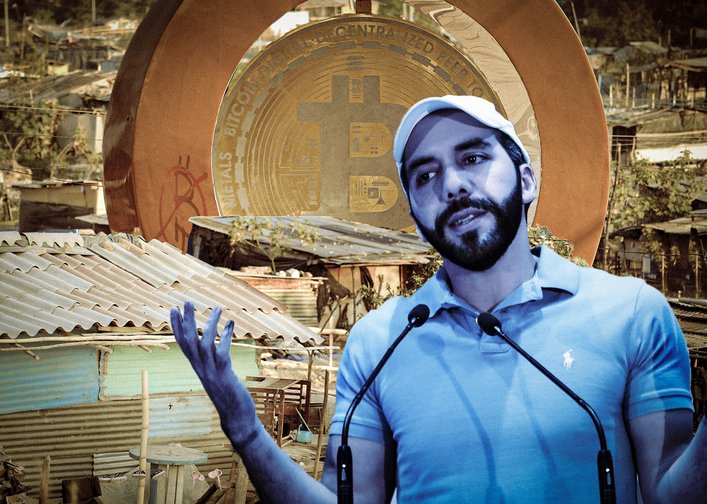
Bukele’s dream of a Bitcoin bonanza is threatening deprived communities
Jose Cabezas/Bloomberg/Alex Peña/Getty
Please type and press enter
Many Salvadorans have a different story to tell about the ‘Bukele miracle’ – so why did they vote to re-elect him?


Bukele’s dream of a Bitcoin bonanza is threatening deprived communities
Jose Cabezas/Bloomberg/Alex Peña/Getty
MORAZÁN, EL SALVADOR — Salvadoran street vendor Maria* earned just $10 selling sweets and handicrafts today – a particularly bad day. It’s half of what she usually gets: $20 on average; $25 if she’s lucky.
“Sales are not good. There is tourism in the area, but people don’t come to the village,” she tells openDemocracy in the square of Osicala, a small municipality in Morazán, eastern El Salvador. It’s a four-hour drive from San Salvador, the capital, on a winding road interspersed with volcanoes and fruit stands. It’s also 110 kilometres from the slopes of the Conchagua volcano, where president Nayib Bukele has promised to create Bitcoin City – a tax-free, smart city bonanza.
If his ambitious project is realised, that distance could soon feel like a million miles.
The economy, María says, is getting worse. The cost of the basic food basket (a monthly set of essential food items for four people), has risen by about $50 in the last four years and accounts for almost three-quarters ($258) of the minimum wage ($365 – the US dollar has been the official currency of El Salvador since 2001).
“Everyone says so: prices are too high,” she says.
María voted for the re-election of Bukele – the self-styled “coolest dictator in the world” – on Sunday 4 February. He won with 84.6% of the vote – though 48% of the electorate didn’t vote – and his New Ideas party won 54 of the 60 seats in Congress, sweeping away the opposition.
The result was challenged – albeit unsuccessfully – because Bukele was allowed to stand despite El Salvador’s constitution prohibiting re-election and also because of irregularities in the counting, which came to an abrupt halt on election night and triggered complaints of miscounted votes.
But his re-election came as no surprise. While it’s not uncommon to hear Bukele voters complaining about officials and deputies, blaming them for the poor shape of the economy, the president himself seems to be shielded.
“Nobody is at Bukele's level. He has brought purely good ideas, but they don’t always get him”, a taxi driver told me the day before the election.
Bukele’s greatest achievement is having dismantled the gang structure that reigned in the country for decades. According to official data, murders have fallen by over 60% on his watch, and in 2023 the country had the lowest rate in its history (2.4 homicides per 100,000 inhabitants).
“The president has done well,” Maria says. “Before, you couldn’t go out. Now you feel more comfortable, you can walk safely, go to the parks.”
These responses are repeated in both urban and rural areas of the smallest and most densely populated country in Central America, which is home to 6.3 million people.
There’s always a personal story of what it was like to live with the gangs and what has changed – the streets and roads no longer blocked, the weekly “rents” (extortions) no longer paid.
Bukele’s security policy, which imprisoned more than 75,000 people and imposed a never ending state of emergency that enables arbitrary detentions and extends judicial terms indefinitely, has become famous in Latin America, where it is gaining more and more imitators.
“We see Bukele as a redeemer, someone God sent us to save us from this criminal catastrophe,” one of his supporters told me outside a polling station. The president’s popularity is reinforced by a powerful propaganda machine on social networks, where his image is that of an influencer.
But as criminality seems to be curbed, other concerns surface. Growth has been weak, extreme poverty has swallowed up some 80,000 new families (it now affects almost 9% of the population, while 30% are classed as poor) and half the country suffers from food insecurity.
Back in 2021, the Bitcoin Law made the cryptocurrency legal. A few months later, it was already clear that its impact on Salvadorans’ daily life was going to be negligible.
As the government embraced the cryptocurrency and spent an estimated $100m plus to purchase bitcoins using confidential funds, Bukele announced a series of megaprojects in the eastern La Unión department: the Pacific Train, the Pacific Airport and, finally, the Bitcoin City, a tax-free settlement sustained with cryptocurrencies that would tap power from the Conchagua Volcano’s geothermal energy.
None of these projects have been realised, nor do they have an estimated deadline, but they are threatening entire communities with displacement. Far from the capital, and the public gaze, hundreds of families are preparing for a decades-long battle over the land – a battle the government is brushing under the carpet, focusing instead on the utopia it says bitcoin will create.
“Since the Bitcoin Law entered into force, we have seen how real estate speculation has skyrocketed”, César Artiga, a human rights defender and representative of the Global Call to Action Against Poverty (GCAP), told openDemocracy.
“The government has announced several mega-projects aimed at land grabbing. There is an alliance between the so-called bitcoiners, foreigners who land here lured by tax benefits and the freedom to not disclose the sources of their capital, and the sugar cane growers [who are the historical owners of the land].”
For some, the impacts are already being felt. People living in La Unión say the government is trying to displace them right now.
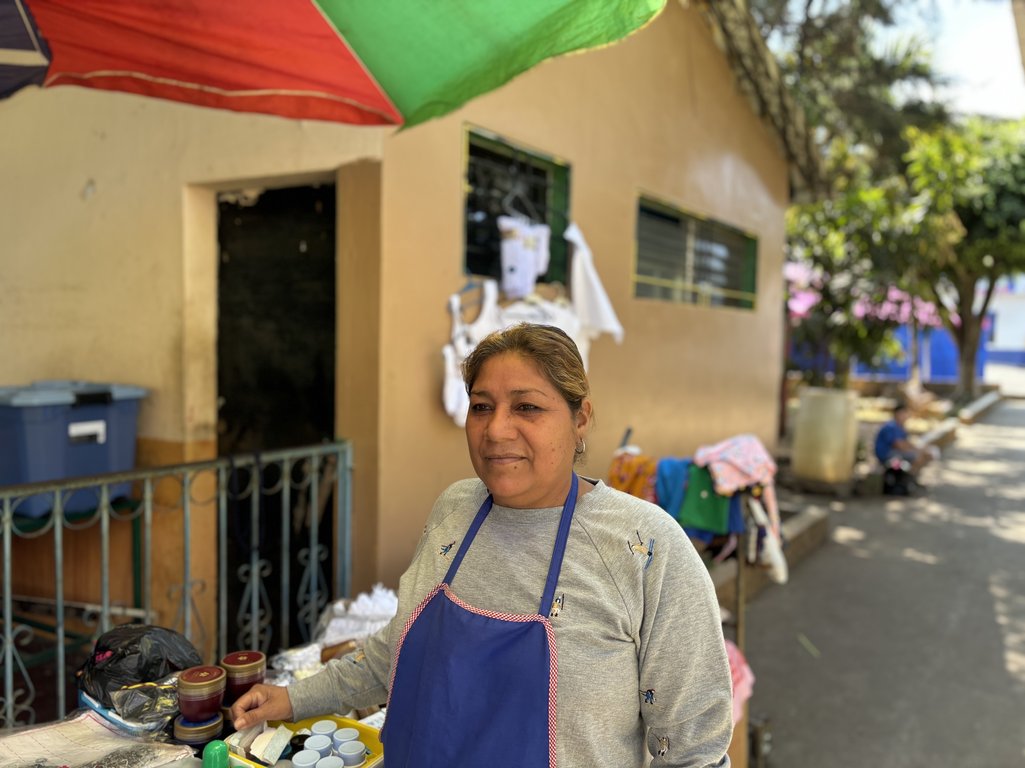
María, a sweets and crafts street vendor in Osicala, El Salvador
Juan Elman/openDemocracy
Erme Martinez, a farmer from Flor de Mangle village, a swampy area in the municipality of Conchagua, where the Pacific Airport is promised, has a video of state officials arriving, gathering neighbours and explaining to them they would offer money to buy their houses so they could move away.
But the amounts offered were far below the value of their homes and not enough to buy similar land elsewhere, according to Martínez.
“The government says those who come to invest here will improve the country. But for us, what investment is there? This year we had no help for agriculture, the government doesn’t care,” says Martínez, standing on land the government wants to turn into a runway.
Others also complain about a lack of support for their produce and a push for more imported agricultural products.
“All this is going to disappear,” says Martínez, pointing to the plantations on the site.
Building an airport in this wet, swampy and overgrown area will require huge investment from sources still unclear, although the government claims the process is underway.
In different areas of La Unión there are signs and posters announcing projects or simply warning that certain lands, previously used communally, are now private property.
Ángel Flores, leader of the Indigenous Movement for the Integration of the Struggles of the Ancestral Peoples of El Salvador (MILPA), founded in 2023 to support communities affected by the planned developments, believes they are just an excuse to modify the land use zoning, classify parcels as public interest lands, auction them off and use them for something else, such as touristic facilities.
On El Icacal beach, José Marvin and Esmeralda Minero, a couple of crab fishers, express their fear that soon they will not be allowed to enter the mangrove fishing areas, where heavy machinery is already operating.
“The crabs are caught on the shore, but that’s impossible with machines and people moving around,” Marvin says. So why did he vote for Bukele last month?
“Bukele got rid of the gangs and that’s good for us. Now I can easily enter communities where I couldn’t sell before,” he explains.
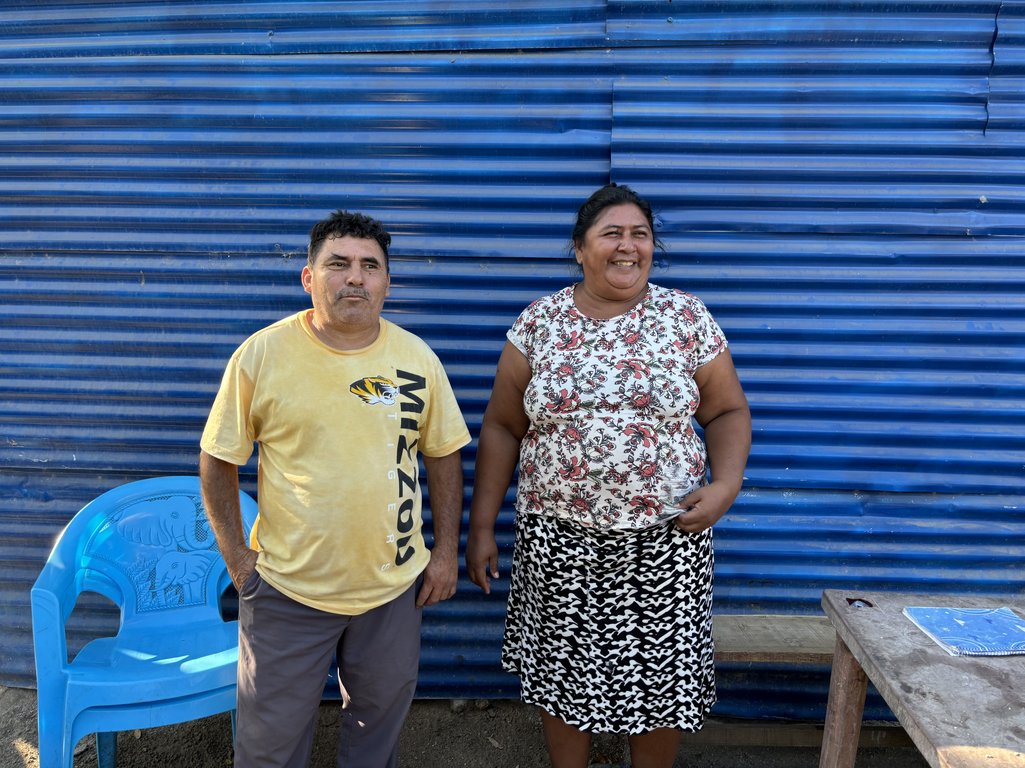
Grab fishers and couple José Marvin and Esmeralda Minero outside their home, metres away from El Icacal beach, El Salvador
Juan Elman/openDemocracy
Minero is one of the many who didn’t vote at all.
“The government has helped the poor, as before [the gangs] put rents on us. And that’s just great,” she says. “But other than that, we haven’t had any benefits from the government. Nobody looks after us here. We are forgotten”.
In Conchagua, where Bitcoin City is planned, neighbours say businessmen have arrived claiming to have bought land from cooperative associations, land they received in the reforms during the Salvadoran civil war (1980 to 1992).
In the unpaved streets and roads, it’s easy to spot evicted houses.
According to economist José Luis Magaña, a professor at the Universidad Centroamericana, all this grandeur in mega-projects hides a harsh reality: “Bukele does not have a plan as such, and his economic policy has been improvised”.
The government provided generous subsidies during the pandemic and carried out some public works, but went no further.
“Only in the last year has he given some signs of where he wants to go, with policies oriented towards tourism and attracting capital,” Magaña added. “But much of what he has done has been through debt.”
Bukele’s government has taken on public debts of almost $9bn, and public debt as a whole hit $28.6bn last year – over 80% of the country’s GDP. So that’s more than a third of the country’s debt accumulated by Bukele in his first five-year first term. But lenders have changed. With limited access to international markets, the government opted to draw funds from treasury bills – known as LETES and sustained by the banks’ savings – and the pensions fund, which Magaña says is at risk of being drained. This is a bubble many fear could burst in Bukele’s second term.
The president is now seeking a $1.3bn loan from the International Monetary Fund (IMF), which in return could force the government to make concessions on fiscal matters, and even amendments to the Bitcoin law. The IMF forecasts the country will grow by only 1.9% this year, one of the lowest rates in the region.
El Salvador faces structural constraints. In addition to its dollarised economy, it does not have many natural resources and imports most of the food it consumes. A quarter of its GDP depends on money sent back by more than two million migrant workers in the United States – and these remittances are the main income for many families.
“Bukele is not committed to transforming these structural conditions,” Magaña says. “The baker who stopped paying extortion money to the gangs has more money in his packet, but still relies on imported wheat.”
He believes protests about poverty and unemployment will grow. “The economy will weigh on the government,” he says, adding that if the president fails to solve financial problems through traditional mechanisms – such as an IMF loan – he could turn to more cryptocurrencies and pay salaries to public employees in the form of tokens.
“At the end of the day, the government would be issuing currency,” he says. “That can be a lifeline of last resort.”
But should material conditions remain unchanged, even the achievement of security may come to nothing.
The gangs that controlled entire areas may have been dismantled, but the state has not filled the vacuum by investing in education, health or other social policies. The lack of a plan to tackle the roots of the gang phenomenon – school dropouts, a lack of employment opportunities for the youth – may contribute to the re-establishment of criminal networks in the future, experts fear.
Rina Montti, research director at human rights organisation Cristosal, and human rights activist Artiga point to remnants of vigilante structures in territories formerly controlled by gangs, as well as the persistent problem of drug trafficking.
A report by the Insight Crime website says: “Unprecedented power in the hands of security forces with a questionable past [involved for example in death squads during the civil war] could create the conditions for officials to engage in crime or even usurp criminal rackets left behind by gangs.”
“When you go to the territories you realise that drugs are still in the communities," Artiga says. “And if the drug trade was run by the gangs, and the gangs have been dismantled, how is it that drugs continue to move? Who is left with this business?”
Bukele worked as a publicist in his father’s agency before pivoting to politics, initially among the ranks of the leftist Farabundo Martí National Liberation Front (FMLN).
But he is now so present in the public imagination that there are no more posters or advertisements adorned with his face; his campaign for last month’s election focused instead on the legislative seats.
The official messaging described a government that put an end to poor governance and corruption. Outside the capital, political posters are more scarce. But every so often, blue and white billboards – Bukele’s party’s colours – advertise public works or projects under construction, along with the slogan: “Money is enough when no one steals” – his motto.
The posters also bear the seal of the Department of Municipal Public Works (DOM in Spanish).
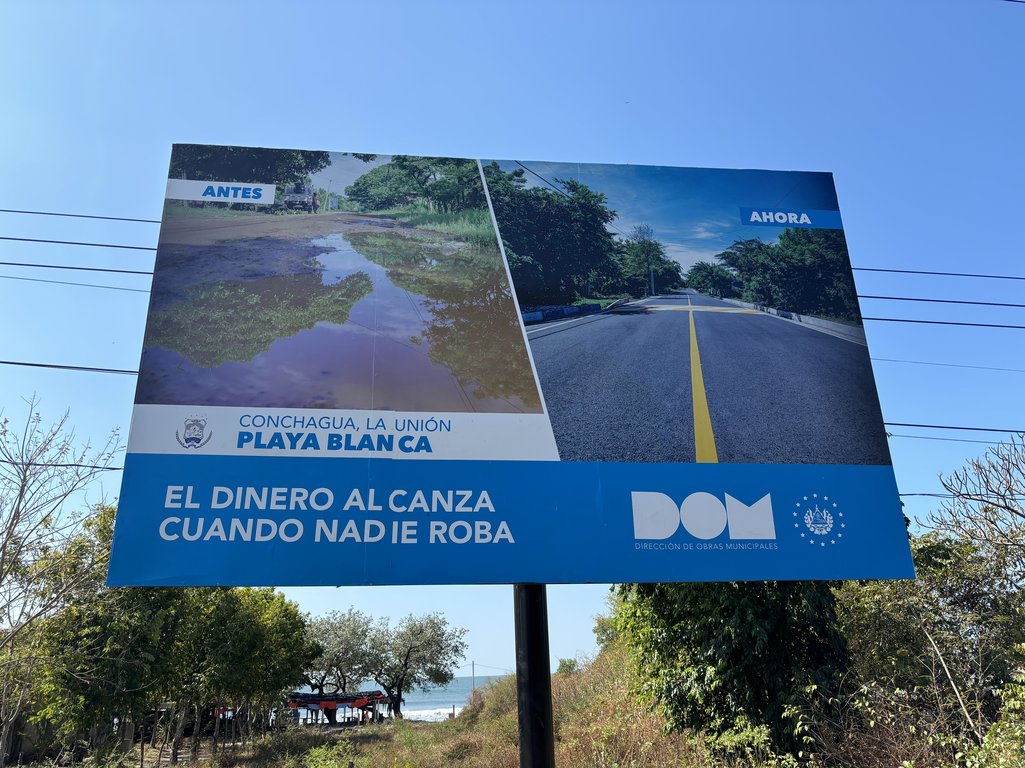
A billboard of El Salvador’s Department of Municipal Public Works (DOM) publicises the pavement of a road in Conchagua municipality
Juan Elman/openDemocracy
Created in 2021, the DOM manages a portion of the budget previously given by the government to municipalities. It covers the construction of local public works, and mayors’ offices now have to ask for funds and wait for sign off, instead of approving works themselves. As a result, mayors have lost resources and power.
These changes were accompanied by an anti-corruption narrative from Bukele, who accused mayors of stealing money intended for public works. On 1 May, the country’s 262 municipalities will merge and become 44, another change reinforcing a centralised power. (Similarly, the government cut the number of congressional seats from 84 to 60 and enacted a new electoral system that benefits Bukele’s New Ideas party).
“The government has abandoned the most vulnerable population”, mayor of San Simón, Natanael Fuentes, tells openDemocracy.
His municipality, located in Morazán, is one of the poorest in the country. “The health outpost clinic and the police station, which rely on the government, come here to ask us to give them money for fuel or to repair vehicles; we are the ones who help the schools with the little we have.”
Fuentes, 36, who came to office in 2021 through the right-wing ARENA party, doesn’t deny corruption. “It is said that mayors used to steal, but at least there were public works”, he says in his office, guarded by two flags: one from El Salvador and the other from Israel.
“Security has been strengthened, but in other areas there is a lot of decay.”
Fuentes will lose his mandate when San Simón municipality disappears on 1 May. His party only won the mayoralty of one of the new 44 municipalities in local elections on 3 March. Bukele’s Nuevas Ideas won 26 mayorships and five other parties allied to the ruling party won 17, according to the official count.
On the road linking San Simón and Osicala, next to an abandoned football pitch, a group of women are cleaning and tidying what looks like a convent. They are led by Ednok Benitez, a 35-year-old pastor of the Central American Mission, the oldest evangelical church in the country. The group is working to build a children’s care centre, named the Ministry of Integral Development, with funding from the US-based evangelical NGO Compassion International.
The church also uses the funding from Compassion to pay families to plant food staples.
“Some people live on only $6 a day, there are no jobs and prices have skyrocketed,” Benítez says. But he would not blame the government. “There is a lot to do, and it’s not easy to do it all alone. Bukele has done a good job. We only hope that now he can provide a solution for those in need.”
Other communities have turned to self-management. In the rural canton of Las Quebradas, on the outskirts of San Simón, a group of neighbours have organised themselves to collect remittance money and fix the potholes in their roads.
“Remittances are the most important thing we have now. I don’t know what we would do without them,” says Wilson*, a community leader. He believes most of his neighbours voted for Bukele out of fear the gangs would return if they did not. “People are afraid,” he says.
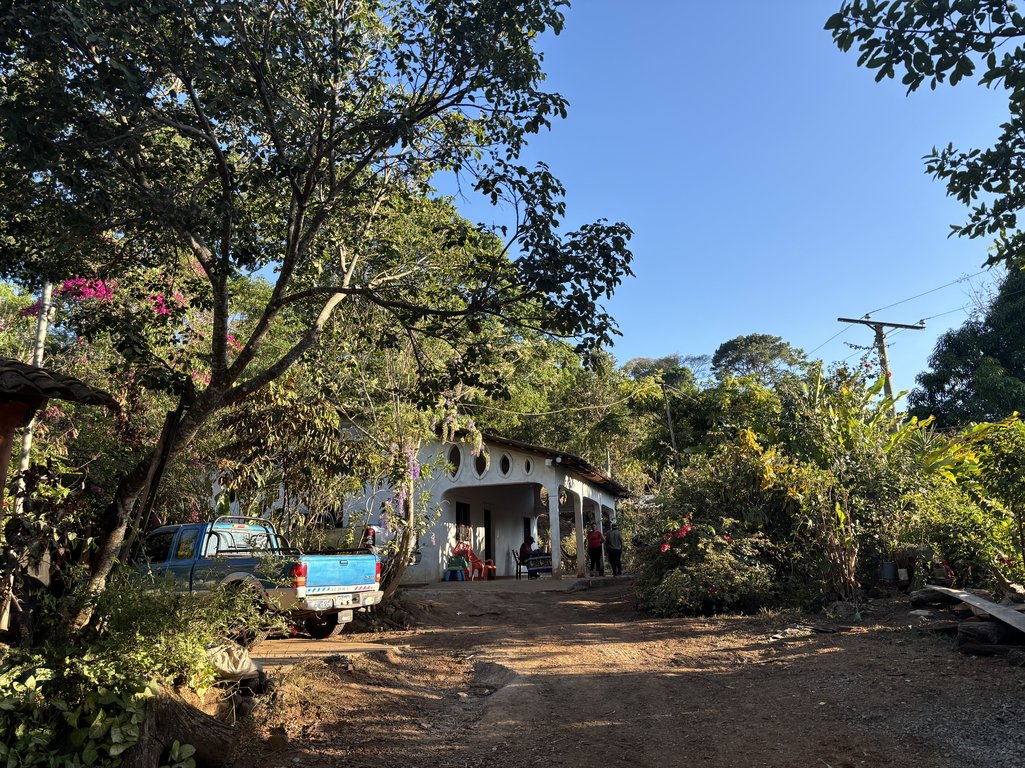
A house in Las Quebradas canton, El Salvador, where local residents complain about the lack of governmental support for local agriculture
Juan Elman/openDemocracy
Wilson says the government has forgotten them, and highlights the budget transfer to the DOM as particularly damaging. Bukele’s flagship public library development next to the governmental palace in San Salvador – funded by China – also comes in for criticism here.
“The library [the government] built in San Salvador is really nice, but what good is it to us?” he says.
Artiga, of GCAP, also references the lack of public services in rural communities.
“What you see is the military and security forces. What are Bukele’s public policies on important issues like food, the water crisis and unemployment? There are none,” he says.
According to Artiga, environmental regulations are ignored or relaxed to give way to projects such as Ciudad Valle el Angel. This proposed mini-city would include several thousand houses and apartments, along with restaurants, hotels, hospitals, schools and a bus terminal to be built over one of the aquifers that provide fresh water to the capital.
This is one of several major projects announced in recent years, some of which involve people in Bukele’s close circle.
openDemocracy contacted several government officials for interviews on this and other issues, but received no response.
Indigenous leader Flores says Bukele’s state of emergency has left activists and residents in Conchagua scared to protest or file complaints about attempts to displace them.
By early 2023, Socorro Jurídico, a legal support group, had documented 16 trade unionists detained under the state of emergency. Hundreds more have been fired or suspended from their workplaces. This is part of a larger problem: between 35% and 40% of the 75,000 detentions under the emergency rule were arbitrary.
Human rights researcher Montti says: “More and more dissident voices are being silenced. People say: ‘We have security, but we also have poverty’. Bukele has tried to distribute food baskets in poorer areas to alleviate the situation, but there will be a breaking point.”
*Some surnames were omitted for security reasons.
Get our weekly email

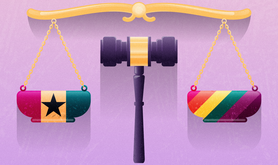
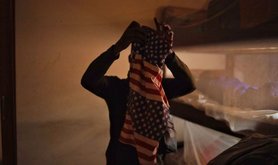
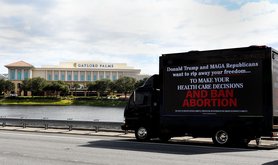
Comments
We encourage anyone to comment, please consult the oD commenting guidelines if you have any questions.